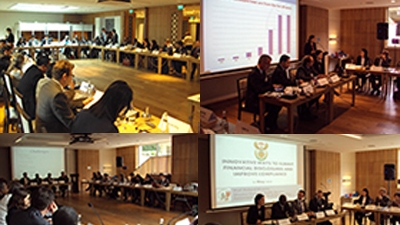Disclosure of financial and business interests by public officials has become a widespread mechanism used both for the prevention and detection of corruption. According to World Bank data, around 138 countries worldwide have disclosure regulations. Not only are disclosure systems gaining ground globally, but they are also experiencing a lot of innovation domestically.
In order to promote knowledge sharing on innovative practices in disclosure, the World Bank together with the Prime Ministry Inspection Board of Turkey, organized the conference entitled “Increasing the Effectiveness of Disclosure Systems through Innovation.”
The conference was a joint endeavor of the Financial Market Integrity (FFSFI) and Public Sector and Governance (PRMPS) units with support from the World Bank office in Turkey and funding from the Governance Partnership Facility (GPF).
Key Takeaways:
The following are recurring themes which cut across all panel discussions:
1) Electronic filing of disclosures is gaining ground. There are a number of success stories in this area showing how electronic filing can be adapted to disclosure systems and contexts that have different volume of filers, institutional capacity, levels of dedicated resources, budget, etc. There is also a growing number of countries developing this tool in-house with local IT experts and showing great cost-efficiency both at the development and maintenance stage. In countries that provide access to the public to the content of disclosures, electronic filing also facilitates making this information available on-line.
2) Innovative solutions for filers’ support. Providing guidance and support to officials through guidelines attached to blank disclosure forms, on-line chat systems, dedicated telephone hotlines, e-mail and text message reminders about deadlines are some of the initiatives standing out for: 1) officials to become familiar with the disclosure process and also minimize filing mistakes and 2) disclosure agencies to strengthen compliance and submission process.
3) Initiatives for a targeted approach. Better targeting of officials who have the obligation to disclose and prioritizing disclosures for verification, particularly in systems with large filing populations.
4) Effectively managing conflicts of interest. Countries agreed that this task requires, in most cases, to focus both on: a) providing an advisory function (which aims to provide guidance and prevent the occurrence of conflict of interest situations), and b) checking the information disclosed to identify conflict of interest.
5) Increasing importance of International cooperation. Accessing information on assets held abroad in the context of verification is an emerging issue. Conference participants considered that more global debate is necessary and the World Bank was invited to play a major role in convening this dialogue.
While financial disclosure practitioners have previously had opportunities to share experiences and lessons learned with peers from within their regions at World Bank conferences in Latin America and Asia and other anti-corruption events, so far there have been limited opportunities for inter-regional dialogue on disclosure practices and innovation. This event sought to bridge this gap and bring together practitioners for what was probably the first global event on financial disclosure.
The conference demonstrated how innovation is important to developing and increasing effectiveness of disclosure systems across all regions, regardless of the type of disclosure system a country has: large or small filing population; centralized or decentralized disclosure system; and institutions solely dedicated to disclosures or with a broader mandate.
Participants readily commented how innovation through technology contributed to increasing compliance rates i.e. submitting disclosure forms, enhancing verification processes by automatic cross-checking with online databases, and lowering the overall cost of financial disclosure system with an electronic system. Participants also remarked how it enabled public access through online publishing of disclosures.
In bringing these practitioners together, the conference produced truly global debates on challenges, experiences, and ideas regarding financial disclosure systems through the prism of innovation. The conference also fostered strong, durable contacts between participants with the aim of continuing this knowledge-sharing and facilitating international cooperation to ultimately strengthen their disclosure systems.
